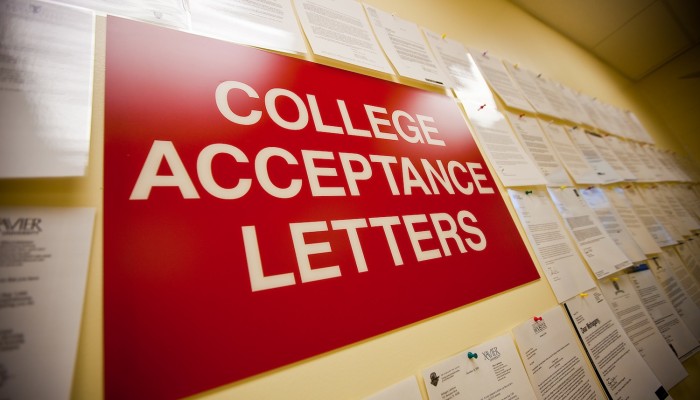 It’s hard to navigate that long, slow, sinking feeling that accompanies a silence in the days and weeks after sending out a barrage of college applications. The thought that not even one of them managed to draw any attention can be extremely discouraging. So many of us slip into that vicious cycle of self-defeat when we realize that we’re probably not going to get any of those greatly desired college acceptance letters.
It’s hard to navigate that long, slow, sinking feeling that accompanies a silence in the days and weeks after sending out a barrage of college applications. The thought that not even one of them managed to draw any attention can be extremely discouraging. So many of us slip into that vicious cycle of self-defeat when we realize that we’re probably not going to get any of those greatly desired college acceptance letters.
Take heart, though! You’re not alone. The good news is that life doesn’t stop with a letter, nor does it hinge on any single college opening up its doors to you. On the contrary, if you keep your head up and focus on the next steps, you can overcome that temptation to give in to pessimism.
Stay Positive
It sounds cliche, but first and foremost, it is really critical to stay positive. Rather than wallow in the depths of despair and rejection, remember that there are many others dealing with the same situation as you at this moment. Particularly if you’ve applied to any of the more prestigious schools, the chances of being accepted on your first go are probably slimmer than you realize.
Many schools face serious shortages in space that make rejections completely normal. Back in 2008, for example, John Hopkins University had to reject over 90 percent of its applicants simply due to the fact that they had a very limited number of slots available for a huge pool of candidates. However, before you accept your fate and move on to Plan B, it may be worth taking the time to do a quick follow up on the application forms and letters that you’ve already sent.
Following up
It should come as no surprise that colleges receive a huge number of applicants each year. With such a high volume of candidates, it’s not unheard of for some applications to slip through the cracks. It can be worth your while to take some time in order to confirm that your applications have, indeed, been received and processed.
 Typically, a college will send a confirmation email once they’ve received your information, so if you haven’t seen an email from each of colleges you’re waiting to hear from, consider following up to make sure they received and properly processed your request for admission. In addition, many colleges have options to see the status of an application. Before you assume that the silence is a flat denial, take a look to see if your application has been fully processed, that there is no documentation like transcripts or recommendations the school still needs or that it is still waiting in the queue.
Typically, a college will send a confirmation email once they’ve received your information, so if you haven’t seen an email from each of colleges you’re waiting to hear from, consider following up to make sure they received and properly processed your request for admission. In addition, many colleges have options to see the status of an application. Before you assume that the silence is a flat denial, take a look to see if your application has been fully processed, that there is no documentation like transcripts or recommendations the school still needs or that it is still waiting in the queue.
Weigh Your Options
Once you’ve confirmed that applications have all been reviewed and you did not gain admission to one of your schools, you should stop and take stock of your situation. Consider the odds of getting into the colleges that you’ve applied to. There are apps that can actually calculate your likelihood of getting into a specific college. If you have a 10 percent chance, you may want to move on. If you have a 90 percent chance, it may be worth circling back around to try again.
Rolling Admissions
As the old saying goes, “if at first you don’t succeed, try, try again.” If your odds are favorable and you’ve decided to try to apply to a college again, rather than sitting on your hands for a semester, it may be worth checking to see if which other schools you might consider going to have some form of rolling admissions in order to fill up any vacancies.
Community College
The fact that you want to graduate from a prestigious university doesn’t necessarily mean you need to start at one. Another option to keep things moving forward is to consider starting at a community college with the intention to apply again and transfer to the school of your choice down the road. A year of strong grades at a community college is a powerful signal to colleges that might overcome weaknesses from your high school transcript. Not only will this help you get going, but it will save you money in the long run to take core classes at an affordable rate rather than at university price.
A Gap Year
College is not the definition of a person. Rather than staying fixated on the unrealistic obsession of getting into any college at any cost, consider taking a gap year. We’re not just talking about a chance to sit around and play video games. Rather, it’s an opportunity to develop yourself outside of the academic world.
Volunteering, for example, can be an excellent way to impact both you and your surroundings, and it’s a practice that’s gaining becoming more common across the academic and business landscape. The beauty of volunteering is that it really is a win-win scenario. In addition to the obvious benefits that volunteering can have towards a cause, it can also foster self-esteem as well as teach you new skills, not to mention the obvious fact that it can help bolster your resume.
Like volunteering, internships are an excellent way to highlight your soft skills and demonstrate your ability to interact and thrive in a career setting apart from the more highly-technical elements that come along with your degree. Once again, having a solid internship on your resume is going to help both with college acceptance and landing that dream job afterward. Here are a few tips we’ve pulled together to help with navigating the often intimidating world of internships.
Consider a Different Path
If you applied to colleges without a set major or goal in mind, you may consider a vocational school as well. By attending a vocational school, you earn specialized skills to get into the workforce faster. Then, while you are working, you can save money and take the time to consider if you’d really like to continue at a university, or what you’d like to do long term. You may even find that the vocation you chose is a career path you’d like to advance, and seek a degree that will help you head in your desired direction.
Use Your Time Wisely
Finally, remember that whether you receive that acceptance letter or not, life doesn’t stop at college. If you can manage to turn a curveball into a life-changing opportunity, chances are you’ll be setting yourself up for long-term success in more ways than simply getting a degree. You’ll be teaching yourself the ability to adapt and make the best of every situation you find yourself in. That is a skill that will pay you back in spades throughout life.
By Devin Morrissey: Devin is a jack of all trades from Daly City, but now roams the West Coast. He returns home to coach rugby and fix his friends’ cars, but luckily he can write from anywhere.



